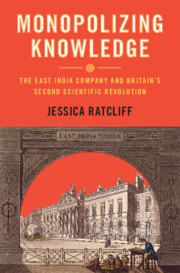Book contents
- Monopolizing Knowledge
- Science in History
- Monopolizing Knowledge
- Copyright page
- Dedication
- Contents
- Figures
- Acknowledgments
- Introduction
- Part I The Making of Company Science, 1600–1813
- 1 Science under the Company before Company Science
- 2 The Roots of Company Science in Asia
- 3 The Pull of Company Science to London
- Part II From Company Science to Public Science, 1813–1858
- Bibliography
- Index
3 - The Pull of Company Science to London
from Part I - The Making of Company Science, 1600–1813
Published online by Cambridge University Press: 02 January 2025
- Monopolizing Knowledge
- Science in History
- Monopolizing Knowledge
- Copyright page
- Dedication
- Contents
- Figures
- Acknowledgments
- Introduction
- Part I The Making of Company Science, 1600–1813
- 1 Science under the Company before Company Science
- 2 The Roots of Company Science in Asia
- 3 The Pull of Company Science to London
- Part II From Company Science to Public Science, 1813–1858
- Bibliography
- Index
Summary
This chapter follows the creation and early growth of Company science in London. The Company first began taking a direct stake in education and the sciences with the establishment of botanical gardens, medical training colleges and other institutions in British India. But around the turn of the century, the foundation of the new library-museum and colleges in Britain would sharply redirect the growth of new Company-run initiatives for science and education back to Britain. That shift toward a new, London-centered set of institutions and priorities related to knowledge management took full advantage of the Company’s legal monopoly on access to Asia’s knowledge resources. And it would begin with the stepwise incorporation into the administration at India House of the work of the orientalists, naturalists, collectors covered in the previous chapters. The London careers of a set of nabob-scholars – Robert Orme, Alexander Dalrymple and Charles Wilkins from Chapter 2, as well as William Marsden – illustrate how the early beginnings of Company science in London flourished at the porous boundary between individual and corporate ownership.
Keywords
- Type
- Chapter
- Information
- Monopolizing KnowledgeThe East India Company and Britain's Second Scientific Revolution, pp. 59 - 100Publisher: Cambridge University PressPrint publication year: 2025

